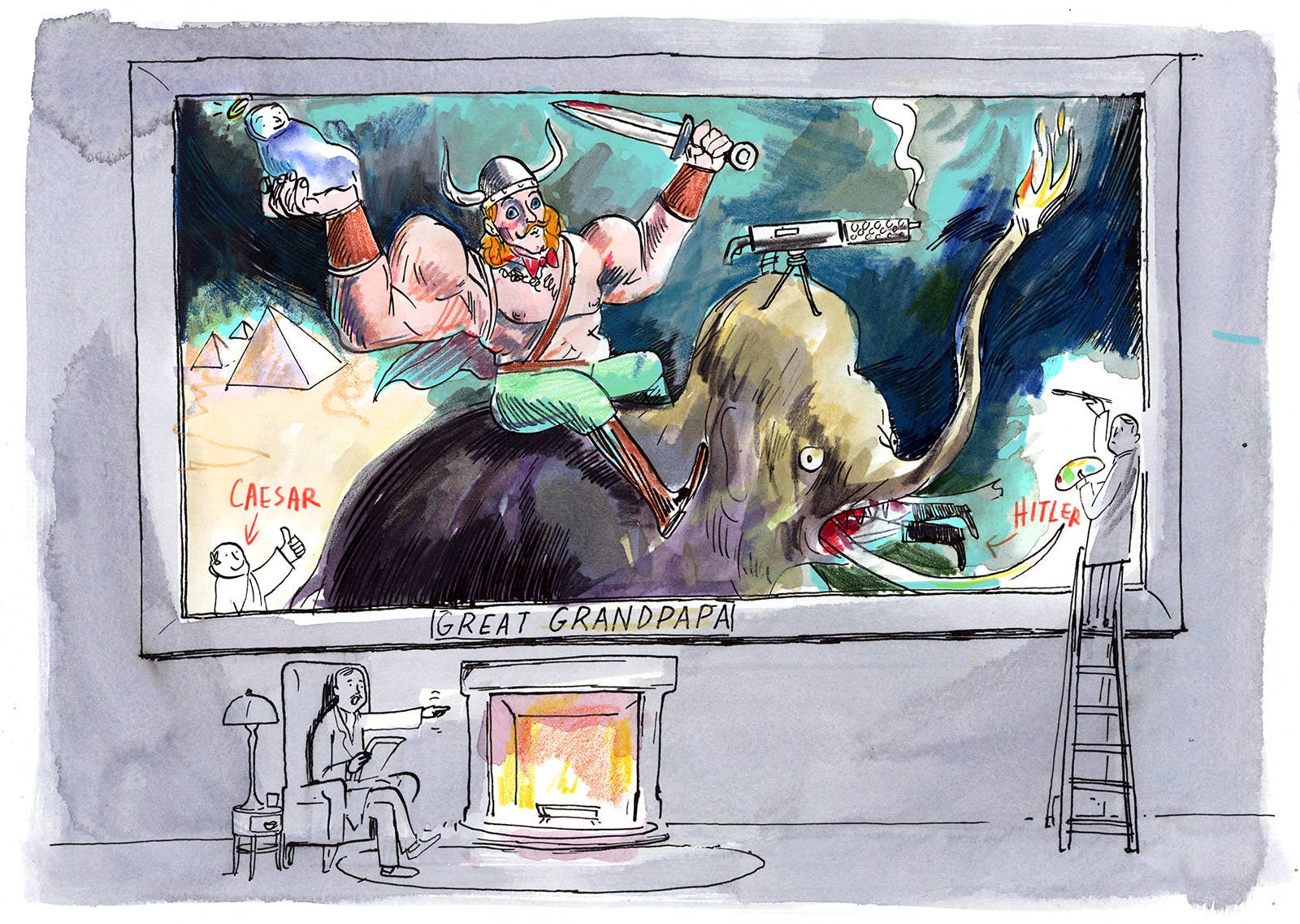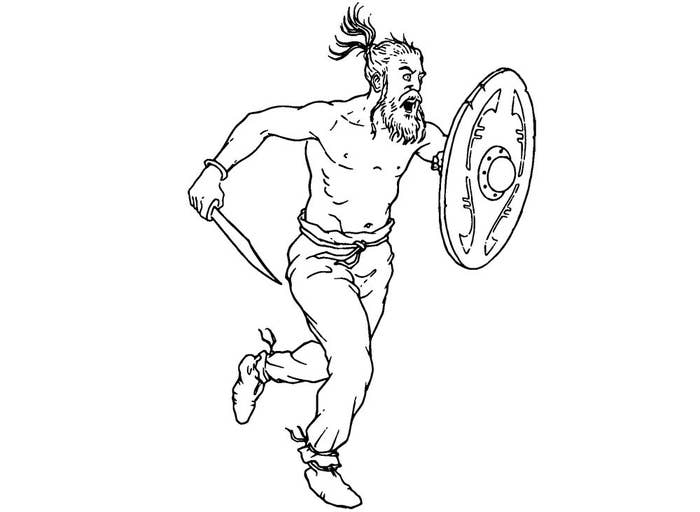
A company which has offered genetic ancestry testing to tens of thousands of people has told customers “mostly total bollocks” about their ancestors, according to a leading scientist.
BritainsDNA is a small player in the genetic genealogy arena, dominated by Ancestry.co.uk and 23andme.co.uk. Yet its eye-catching claims – including telling one customer they were descended from people who created “the first example of religious art in the west”, 32,000 years ago – have caught the attention of the Times, the Telegraph, the Daily Mail, and the BBC Radio 4 Today programme, where its founder was interviewed by Jim Naughtie.
While no one appears to take issue with the actual DNA testing carried out by BritainsDNA, a large amount of what it then goes on to claim about people’s ancestry is misleading, or generic in the sense that the same information is true of lots of people of European descent, in the opinion of scientists contacted by BuzzFeed News.
Dr Adam Rutherford is a geneticist and the author of A Brief History of Everyone Who Ever Lived, a book published in September which alleges that BritainsDNA makes “meaningless”, “speculative” and “unsupportable” claims. He told BuzzFeed News that the descriptions of ancestors accompanying BritainsDNA’s genetic test reports are “eloquent, but mostly total bollocks”. He had his own test done in 2015. “I came out as ‘Germanic’,” he said. “They talk about this tribe struggling across the frozen Rhine as they moved westward towards the UK. They showed a picture of a guy with drawstring trousers and his top off, wielding a shortsword.”
This information has little scientific value as far as he is concerned: “It’s not true. Or rather, it’s true for everyone [of European descent]. They’re selling base sentimentality.”

BritainsDNA was founded in 2011 by Alistair Moffat, a Scottish journalist and entrepreneur.
There are lots of companies that offer to take your DNA and test it, for health, ancestry, or genealogical purposes. BritainsDNA, like its rivals, sends customers a small DNA-testing kit, which is used to take saliva and cells from the inside of their mouth.
This testing is entirely valid, scientists told BuzzFeed News. For instance, the tests can tell you whether you’re at increased risk of certain genetically influenced diseases, such as Alzheimer’s. And they can provide information about living relatives and recent ancestry.
However, when BritainsDNA mixes them with descriptions that purport to say what your ancestors were doing hundreds or thousands of years ago, they are making historical claims that the science cannot support, says Rutherford.
For instance, Rutherford’s BritainsDNA report, seen by BuzzFeed News, talks about the history of ancient Britain, in which “Romanised town-dwellers did their best to resist the invasion of these pagan barbarians – your ancestors”. But those “town-dwellers”, says Rutherford, were also his ancestors.
That’s because the number of your ancestors doubles every generation you go back, he explains. You have two parents; four grandparents; eight great grandparents, and so on.
On average, a human generation takes about 28 years. At that rate, by the time you’ve gone back 1,100 years, you would have about 600 billion ancestors, says Rutherford. “By that point there are more people in your family tree than have ever existed,” he says. Of course, that’s not possible; instead, there’s lots of overlap, so your great-great-[etc]-grandfather is also your great-great-[etc]-uncle and your 10th cousin twice removed, and so on.
What that means is that it’s meaningless to talk in terms of what “your ancestors” did over 1,000 years ago, according to Rutherford: Everyone who was alive at that time in, say, Europe is either the ancestor of every European currently alive, or of no one at all – because their line died out.
“All European family tree lines converge in approximately the 10th century,” says Rutherford. “For instance, Charlemagne was a 9th century ruler. So Charlemagne is the ancestor of literally every European.” The point in time where everyone’s lines of ancestry cross is called the “genetic isopoint”.
So, he says, claiming – as BritainsDNA did in 2012, in a report to another customer, also seen by BuzzFeed News – that “your ancestors almost certainly brought to Britain a technology that changed society profoundly” (that technology being porridge, 3,000 years ago) is nonsense. If you go back 3,000 years, your ancestors are almost everybody’s ancestors.
BritainsDNA has made other, similar claims. Also in 2012, it sent one of its customers a report saying that their “fore-mothers arrived in the British Isles and Ireland around 3,000BC” and brought the techniques of farming with them.
Again, says Rutherford, all of those claims are true of everyone of European descent.
There’s another reason to be sceptical of some of BritainsDNA’s claims, critics say: that they are speculative in their interpretation of something known as “haplogroups”.
To understand this, we need to look at how DNA testing works. Two kinds of DNA testing are of interest when looking more than a few generations back into history: Y chromosome tests and mitochondrial DNA (mtDNA) tests.
The Y chromosome is the chromosome that determines that a foetus is male. It is passed down through the male line – every male has one, and he inherited it from his father, and from his father, and so on. Mitochondria are little rod-shaped things that live in almost all the cells of your body and provide energy for your body to use. They are descended from bacteria and have their own, small genome, separate from the rest of your DNA. Men and women both have them, but they are passed down through the egg, meaning that all of your mitochondria come from your mother.
Unlike the rest of your DNA, mtDNA and Y-chromosomal DNA are not shuffled around by sexual reproduction, so they remain unchanged, apart from mutations. This means they’re not unique to individuals. Broadly speaking, you share your mitochondrial DNA with your mother, all her siblings, all her sisters’ children, her mother, all her siblings and so on. There could be millions of people who share your Y-chromosome or mtDNA.
The type of Y-chromosome or mtDNA you have is known as your “haplogroup”, and essentially corresponds to a branch on your family tree. BritainsDNA’s latest tests tell customers what haplogroup they’re in, and where they’re common around the world; then they claim to tell you where those haplogroups originated. Its website offers customers the chance to “Discover where your ancient ancestors came from and their journey across the globe.”
The study of mtDNA and Y chromosomes has led to important scientific discoveries about how populations have moved, such as the fact that humans came out of Africa about 200,000 years ago. Tests such as those carried out by Britain’s DNA reliably tell customers what haplogroup they’re in, but David Balding, a professor of computational biology at the University of Melbourne, told BuzzFeed News that BritainsDNA “exaggerate the meaningfulness” of what haplogroups can tell you about where an individual’s ancestors come from.
One problem is that the fact that people who share your haplogroup live somewhere now doesn’t necessarily mean that their ancestors (and yours) lived in the same place long ago. “If your DNA shows up a lot of matches with people in Russia [today], they’ll say your ancestors came from Russia,” says Balding. “And they might have, but it’s very crude. There are all kinds of other possibilities. Maybe your ancestry traces back to somewhere else, and some of those people moved to Russia.”
Debbie Kennett, a genetic genealogist, who is a volunteer project administrator with one of BritainsDNA’s rivals, Family Tree DNA, agrees: “You can’t assume that, because you find a particular Y chromosome in a place today, that it was present in that place in the past.”
For instance, she says, haplogroup M – which in modern humans is only found in India – has been found in the preserved corpses of ancient people in France and Belgium. When you look at ancient DNA like this, she says, “you end up with all sorts of different haplogroups in unexpected places”.
Mark Thomas, a UCL professor of evolutionary genetics, has previously written that it is “extremely difficult to demonstrate scientifically” claims about the detailed history of your mtDNA or Y-chromosome haplogroup, although it is “reasonable to use large samples of these DNA types to say something about the histories of populations”. Kennett agrees: “[People] have made all sorts of fanciful claims about haplogroups originating in this or that place, but there's no scientific evidence.”
This means that claims such as one BritainsDNA made in 2012 to one customer, in a report seen by BuzzFeed News, that the customer’s mtDNA haplogroup “arose c54,000BC around the shores of the Persian Gulf before those who carried it turned west for the Levant and the Eastern Mediterranean” is “speculation dressed with a thin veneer of evidence”, according to Balding.
Balding, along with Kennett and Thomas, have been engaged in an argument over the scientific basis for some of BritainsDNA’s claims about ancestry since 2012, when its founder Moffat gave an interview on BBC Radio 4’s Today programme that they said was full of unscientific claims. They emailed Jim Wilson, BritainsDNA’s co-founder, and other scientists challenging the claims. Wilson responded, denying their accusations and defending the company’s activities. “While it is true that the Y chromosome and mtDNA only represent a small proportion of our ancestral lineages, they are the ones about which we can learn the most information,” he said.
They say the university received a letter from Moffat, threatening to sue them, as well as a solicitor’s letter demanding they stop claiming that BritainsDNA’s science was “wrong” or “untrue” as a matter of undisputed fact, which the academics refused to do, they say.
Thomas acknowledges that it is “reasonable to use large samples of these DNA types to say something about the histories of populations”, but says “individual Y chromosome or mitochondrial DNA types provide no more than the vaguest hint about where their ancestors lived hundreds, or thousands of years ago.”
Moffat has since sold the company to Source BioScience, where it sits in a portfolio called myDNA.global, along with ScotlandsDNA, CymruDNA, IrelandsDNA and YorkshiresDNA.
Kennett’s view is that the ancestry information the company gives is “generic nonsense”.
She points out that DNA testing “can be legitimately used for genealogy purposes”. For instance, you could find out more information about where your surname comes from, which is passed down the male line like a Y chromosome. Kennett, says she has traced her surname back to the 13th century using traditional genealogical techniques, and, by comparing her male relatives’ Y-chromosome to those of two people she is distantly related to, has used DNA testing to confirm her findings as far back as the 15th century.
“When you combine the genealogical records or historical records with the Y-chromosome data you can make legitimate inferences,” she says. But she views “a fancy report with a haplogroup story” as “completely worthless.”
BritainsDNA declined to comment when approached by BuzzFeed News.
